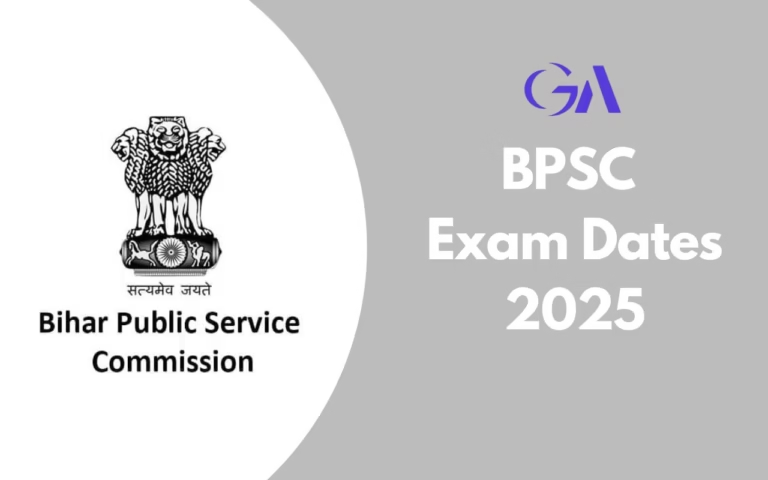SSC JE Syllabus 2025: The Staff Selection Commission (SSC) is expected to conduct the SSC JE 2025 Paper 1 around October-November 2025. This exam is for Junior Engineer (Civil, Mechanical, Electrical, and Quantity Surveying & Contracts) positions. The tentative dates for the SSC JE 2025 Paper 1 have already been announced.

To perform well in the exam, candidates must follow the SSC JE syllabus closely. It is crucial to study all the topics outlined in the 2025 syllabus. Any changes to the syllabus will be officially notified by the authorities.
SSC JE Syllabus 2025
The SSC JE exam consists of two stages: Paper 1 and Paper 2. Paper 1 is an online exam with multiple-choice questions, while Paper 2 is a written exam featuring descriptive-type questions. The SSC JE syllabus covers a wide range of engineering topics, and candidates must thoroughly study all the topics outlined to perform well in the exam.
The Staff Selection Commission (SSC) releases the official Junior Engineer Syllabus alongside the notification. The SSC JE exam is conducted for three engineering disciplines:
- Civil and Structural Engineering
- Mechanical Engineering
- Electrical Engineering
Candidates should prepare for all topics in these subjects, as the Commission can ask questions of varying difficulty in the SSC JE exam.
SSC JE Exam Pattern 2025
To effectively prepare for the exam, candidates must thoroughly understand the SSC JE Exam Pattern 2025. The exam pattern outlines the structure of the question paper, including the number of questions, marks assigned, exam duration, and more.
By reviewing the SSC JE Exam Pattern for both Paper 1 and Paper 2 on this webpage, candidates can familiarize themselves with the exam format and plan their preparation accordingly.
SSC JE Paper 1 Exam Pattern 2025
SSC JE Paper 1 is an objective-type exam with a total of 200 questions, each carrying 1 mark. The exam duration is 2 hours, and there is a negative marking scheme in place, with 0.25 marks deducted for each incorrect answer. Below is the detailed SSC JE Exam Pattern 2025 for Paper 1:
| SSC JE Paper 1 Exam Pattern 2025 |
| Papers |
Questions |
Maximum Marks |
Duration |
| General Intelligence & Reasoning |
50 |
50 |
2 Hrs. |
| General Awareness |
50 |
50 |
| Part –A General Engineering (Civil & Structural) OR |
100 |
100 |
| Part-B General Engineering (Electrical) OR |
100 |
100 |
| Part-C General Engineering (Mechanical) |
100 |
100 |
| Total |
200 |
200 |
SSC JE Paper 2 Exam Pattern 2025
SSC JE Paper 2 consists of 100 objective-type questions based on the specific discipline chosen by the candidates. Each correct answer earns 3 marks, while 1 mark is deducted for each incorrect answer. The total duration to complete Paper 2 is 2 hours.
| SSC JE Paper 2 Exam Pattern 2025 |
| Paper 2 |
Questions |
Marks |
Time |
| Part-A General Engineering (Civil & Structural) |
100 |
300 |
2 Hrs. |
| OR |
| Part- B General Engineering (Electrical) |
100 |
300 |
2 Hrs. |
| OR |
| Part-C General Engineering (Mechanical) |
100 |
300 |
2 Hrs. |
SSC JE Syllabus 2025 for Paper 1
The SSC JE Paper 1 exam will cover subjects such as General Intelligence and Reasoning, General Awareness, and General Engineering for Civil, Electrical, and Mechanical Engineering.
This online exam will include questions on topics like problem-solving, analysis, judgment, decision-making, history, politics, building materials, electrical circuits, and more. For a clearer understanding of the SSC JE Tier 1 syllabus, refer to the table below.
| SSC JE Syllabus 2025 for Paper 1 |
| Subjects |
Topics |
| General Intelligence & Reasoning |
- Classification
- Analogy
- Coding-Decoding
- Paper Folding Method
- Matrix
- Word Formation
- Venn Diagram
- Direction and Distance
- Blood Relations
- Series
- Verbal reasoning
- Non-Verbal Reasoning
- Seating Arrangement
- Puzzles & Seating Arrangement
|
| General Awareness |
- Static General Knowledge
- Science
- Current Affairs
- Sports
- Books and Authors
- Important Schemes
- Portfolios
- People in the News
- History
- Culture
- Geography
- Economic
- Awards and Honors
|
| Part A SSC JE Civil Syllabus |
- Building Materials
- Surveying
- Estimating
- Soil Mechanics
- Costing and Valuation
- Concrete Technology
- Irrigation Engineering
- Steel Design
- Theory of Structures
- Hydraulics
- RCC Design
- Environmental Engineering
- Transportation Engineering
|
| Part B Electrical Engineering Syllabus |
- Basic concepts
- Circuit law
- AC Fundamentals
- Magnetic Circuit
- Electrical Machines
- Utilization and Electrical Energy
- Transmission and Distribution
- Estimation and Costing
- Basic Electronics
- Generation
- Fractional Kilowatt Motors and single phase induction Motors
- Measurement and Measuring instruments
- Synchronous Machines
|
| Part C Mechanical Engineering Syllabus |
- Theory of Machines and Machine Design
- IC Engines Combustion
- Air standard Cycles for IC Engines
- IC Engine Performance
- 1st Law of Thermodynamics
- 2nd Law of Thermodynamics
- Boilers
- IC Engine Cooling & Lubrication
- Classification
- Rankine cycle of System
- Specification
- Engineering Mechanics and Strength of Materials
- Centrifugal Pumps
- Basic Principles & Classification of steel
- Hydraulic Turbines
- Dynamics of Ideal fluids
- Fluid kinematics
- Measurement of Fluid Pressure
- Properties & Classification of Fluids
- Air Compressors & their cycles
- Refrigeration cycles
- Measurement of Flow rate
- Fluid Statics
- Nozzles & Steam Turbines
- Principle of Refrigeration Plant
- Fitting & Accessories
|
SSC JE Syllabus 2025 for Paper 2
The SSC JE Paper 2 exam will be held in Computer-Based Test (CBT) mode. This exam consists of three sections: Civil & Structural Engineering, Electrical Engineering, and Mechanical Engineering. You can find the SSC JE Paper 2 syllabus detailed in the table below:
SSC JE Paper 2 Syllabus for Civil Engineering (Part A)
The SSC JE Paper 2 Syllabus for Civil Engineering includes topics up to the Diploma level. It covers important subjects such as Building Materials, Estimating, Costing, and Valuation, Surveying, Soil Mechanics, Hydraulics, Irrigation Engineering, Transportation Engineering, Environmental Engineering, Theory of Structures, Concrete Technology, RCC Design, and Steel Design.
These topics aim to test the aspirant’s understanding and knowledge of civil engineering concepts. Below is a detailed breakdown of each subject to help you prepare effectively:
| SSC JE Paper 2 Syllabus for Civil Engineering |
| Units |
Topics |
| Building Materials |
- Properties: Physical and chemical characteristics.
- Classification: Testing and uses.
- Manufacturing: Quarrying and production methods.
|
| Estimating, Costing and Valuation |
- Technical Terms: Understanding the key concepts.
- Methods of Measurement: Earthwork, brickwork, RCC work, and more.
- Cost Estimation: For structures like septic tanks, tube wells, steel trusses, and pile foundations.
- Valuation Concepts: Depreciation, scrap and salvage value, sinking fund, etc.
|
| Surveying |
- Principles of Surveying: Distance measurements, compass use, and surveying instruments like the theodolite.
- Leveling and Contouring: Methods, terms, and corrections for curvature/refraction.
- Earthwork Calculations: Use of advanced surveying tools and curve setting.
|
| Soil Mechanics |
- Soil Properties: Void ratio, water content, and specific gravity of soil.
- Soil Classification: Atterberg limits and plasticity chart.
- Permeability: Soil testing and types of aquifers.
- Consolidation: Understanding soil settlement, shear strength tests, and compaction.
|
| Hydraulics |
- Fluid Properties: Hydrostatics and measurement of flow.
- Flow Dynamics: Bernoulli’s theorem and open channel flow (weirs, flumes, etc.).
- turbines etc.
|
| Irrigation Engineering |
- Importance of Irrigation: Methods, types, and effects.
- Hydrology: Rainfall measurement, water requirement of crops, and irrigation efficiency.
- Canal and Well Systems: Types, canal losses, and weir designs.
- Flood Management: Causes, effects, and control methods.
|
| Transportation Engineering |
- Highway Engineering: Design of pavements, materials, and drainage systems.
- Railway Engineering: Components of track systems and track geometry.
- Traffic Engineering: Traffic survey methods, intersection designs, signals, and road safety.
|
| Environmental Engineering |
- Water Quality: Source and purification methods.
- Sanitation and Sewerage: Systems, sewage treatment, and distribution.
- Waste Management: Solid waste types, effects, and control methods.
- Pollution Control: Air and noise pollution causes and management.
|
SSC JE Paper 2 Syllabus for Civil Engineering (Part B)
The SSC JE Syllabus 2024 for Structural Engineering covers key topics related to the design, analysis, and construction of structural elements. It includes concepts such as the theory of structures, concrete technology, RCC design, and steel design.
The syllabus is designed to test the understanding of fundamental principles like beam bending, shear stress, and torsion, along with practical knowledge in designing reinforced concrete structures and steel frameworks.
Topics like elasticity, moment of inertia, mix design, quality control, and construction methods are also crucial. This syllabus prepares candidates for a successful career in civil and structural engineering.
| SSC JE Syllabus For Structural Engineering |
| Units |
Topics |
| Theory of Structures |
- Elasticity Constants: Fundamental constants in material behavior.
- Types of Beams: Determinate and indeterminate beams, and their bending moment and shear force diagrams.
- Beam Sections: Moment of area and inertia for rectangular and circular sections.
- Shear and Bending Stress: Calculations for tee, channel, and compound sections.
- Structures: Design and analysis of chimneys, dams, retaining walls, and eccentric loads.
- Advanced Concepts: Slope deflection, critical load for columns, and torsion in circular sections.
|
| Concrete Technology |
- Concrete Properties: Types, advantages, and uses of concrete, including cement and aggregate properties.
- Water Quality & Water-Cement Ratio: Impact on the quality and strength of concrete.
- Workability & Mix Design: Processes from batching and mixing to placement, compaction, curing, and finishing.
- Quality Control: Concrete quality control, challenges like hot and cold weather concreting, and repair/maintenance of structures.
|
| RCC Design |
- RCC Beams: Design for flexural strength, shear strength, and bond strength, including singly and double reinforced beams.
- Other Components: T-beams, lintels, one-way and two-way slabs, and isolated footings.
- Reinforced Brickwork: Design of columns, staircases, retaining walls, and water tanks.
- Design Methods: Knowledge of both Limit State and Working Stress design methods for RCC structures.
|
| Steel Design |
- Steel Structures: Design of steel columns, beams, roof trusses, and plate girders.
|
SSC JE Paper 2 Syllabus for Electrical Engineering
The SSC JE Paper 2 Syllabus for Electrical Engineering covers essential topics such as Basic Concepts, Circuit Laws, Magnetic Circuits, AC Fundamentals, Measurement and Measuring Instruments, Electrical Machines, Fractional Kilowatt Motors, Single-Phase Induction Motors, Synchronous Machines, Generation, Transmission, and Distribution, Estimation and Costing, Utilization of Electrical Energy, and Basic Electronics.
These subjects are designed to assess the candidate’s knowledge and understanding of electrical engineering. You can find the detailed, topic-wise breakdown of the syllabus for SSC JE Electrical Engineering Tier 2 in the table below:
| SSC JE Syllabus For Electrical Engineering |
| Units |
Topics |
| Basic Concepts |
- Resistance, inductance, capacitance, and the factors affecting them.
- Understanding current, voltage, power, energy, and their units.
- Circuit Laws: Kirchhoff’s laws, and solving simple circuits using network theorems.
- Magnetic Circuits: Concepts of flux, mmf, reluctance, magnetic materials, and calculations for different conductor configurations (e.g., straight, circular, solenoidal).
- Electromagnetic induction, self-induction, and mutual induction.
|
| AC Fundamentals |
- Instantaneous, peak, RMS, and average values of alternating waves.
- Representation of sinusoidal waveforms, series and parallel AC circuits with R.L. and C, Resonance, and Tank circuits.
- Polyphase Systems: Star and delta connections, 3-phase power, DC and sinusoidal responses of R-L and R-C circuits.
|
| Measurement and Measuring Instruments |
- Power measurement (1-phase and 3-phase, active and reactive) and energy, including the 2-wattmeter method for 3-phase power measurement.
- Measurement of frequency and phase angle.
- Instruments: Ammeter, voltmeter (both moving coil and moving iron types), range extension for wattmeters, Multimeters, Megger, Energy meters, AC bridges.
- Use of CRO, Signal Generators, CT, PT, and their applications.
- Earth fault detection techniques.
|
| Electrical Machines |
- D.C. Machines: Construction, working principles of motors and generators, characteristics, speed control, starting methods, braking, losses, and efficiency.
- 1-phase and 3-phase Transformers: Construction, principles, equivalent circuits, voltage regulation, O.C. & S.C. tests, losses, efficiency, and parallel operation.
- 3-phase Induction Motors: Rotating magnetic field, principle of operation, equivalent circuit, torque-speed characteristics, starting, speed control, braking, and effects of voltage/frequency on torque-speed characteristics.
|
| Fractional Kilowatt Motors and Single Phase Induction Motors |
- Fractional Kilowatt Motors and Single-Phase Induction Motors: Characteristics and applications.
- Synchronous Machines: 3-phase EMF generation, armature reaction, voltage regulation, parallel operation, synchronizing, active & reactive power control, starting, and applications of synchronous motors.
|
| Generation, Transmission, and Distribution |
- Power factor improvement, tariff types, faults, and short circuit currents.
- Switchgear: Circuit breaker ratings, arc extinction principles by oil and air, H.R.C. fuses, earth leakage/overcurrent protection, Buchholtz relay, Merz-Price system for generator & transformer protection, feeder, and bus bar protection.
- Lightning arrestors, transmission & distribution systems, conductor materials comparison, efficiency.
- Cables: Types, ratings, and derating factors.
- Power Stations: Types, load factor, diversity factor, demand factor, generation cost, and interconnection.
|
| Estimation and Costing |
- Estimation of lighting schemes, electric installation for machines, and relevant IE rules.
- Earthing practices and IE rules.
|
| Utilization of Electrical Energy |
- Illumination
- Electric heating
- Electric welding
- Electroplating
- Electric drives and motors.
|
| Basic Electronics |
- Estimation of lighting schemes, electric installation for machines, and relevant IE rules.
- Earthing practices and IE rules.
|
SSC JE Paper 2 Syllabus for Mechanical Engineering
The SSC JE Paper 2 Syllabus for Mechanical Engineering includes various technical topics such as the Theory of Machines and Machine Design, Engineering Mechanics, Strength of Materials, Properties of Pure Substances, the 1st and 2nd Laws of Thermodynamics, Air Standard Cycles for IC Engines, and the Rankine Cycle of Steam, among others.
The questions will focus on these subjects to evaluate the candidate’s understanding and knowledge of mechanical engineering concepts. Below is the detailed syllabus for SSC JE Mechanical Engineering Tier 2:
| SSC JE Syllabus For Mechanical Engineering |
| Units |
Topics |
| Theory Of Machines and Machine Designs |
- Concepts of simple machines.
- Four-bar linkage and link motion.
- Flywheels and fluctuation of energy.
- Power transmission using belts: V-belts and flat belts.
- Clutches: Plate and conical clutches.
- Types of gears and their applications.
|
| Engineering Mechanics and Strength of Materials |
- Equilibrium of forces.
- Laws of motion and friction.
- Concepts of stress and strain, elastic limit.
- Elastic constants.
- Bending moments and shear force diagrams.
- Stress analysis in composite bars.
|
| Thermal Engineering |
- Properties of pure substances.
- First and second laws of thermodynamics.
- Air standard cycles for internal combustion (IC) engines.
- Rankine cycle of steam engines.
- Boilers: Types and operations.
|
| Fluid Mechanics Machinery |
- Properties & Classification of fluid
- Fluid Statics
- Measurement of Fluid Pressure
- Fluid Kinematics
- Dynamics of Ideal Fluids
- Measurement Of Flow Rate Basic Principles
- Hydraulic Turbines
- Centrifugal Pumps
- Classification Of Steels
|
SSC JE Syllabus 2025 FAQs
What is the SSC JE exam pattern for 2025?
The SSC JE exam has two papers: Paper 1 is a 200-question objective test, while Paper 2 is a descriptive exam with 100 discipline-specific questions.
When will the SSC JE Paper 1 2025 be conducted?
The SSC JE Paper 1 2025 is expected to be held in October-November 2025.
What subjects are covered in SSC JE Paper 1?
SSC JE Paper 1 covers General Intelligence & Reasoning, General Awareness, and General Engineering (Civil, Mechanical, and Electrical).
What is the marking scheme for SSC JE Paper 1?
SSC JE Paper 1 consists of 200 questions, with 1 mark for each correct answer and a negative marking of 0.25 for incorrect answers.
What topics are included in the SSC JE syllabus for Civil Engineering Paper 2?
SSC JE Civil Engineering Paper 2 includes topics like Building Materials, Estimating, Costing, Surveying, Soil Mechanics, Hydraulics, and Structural Engineering.




